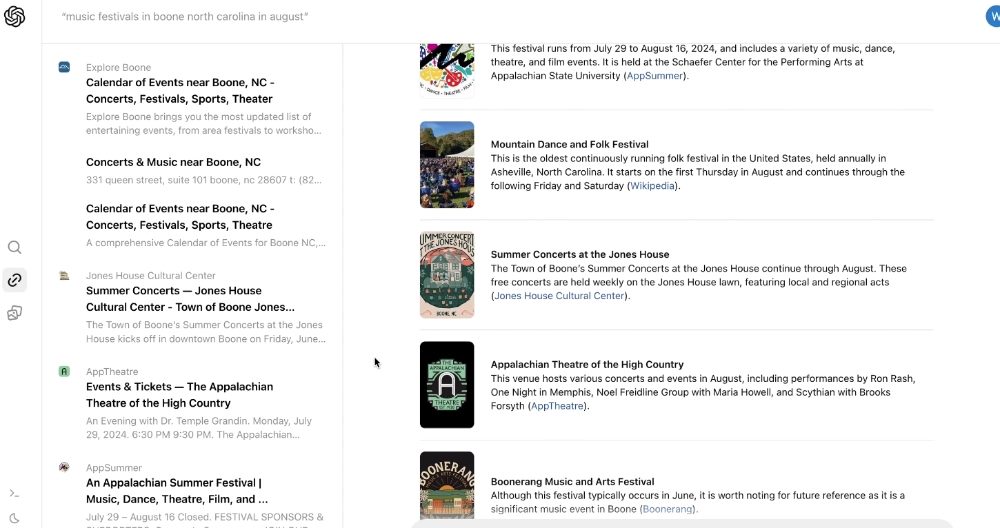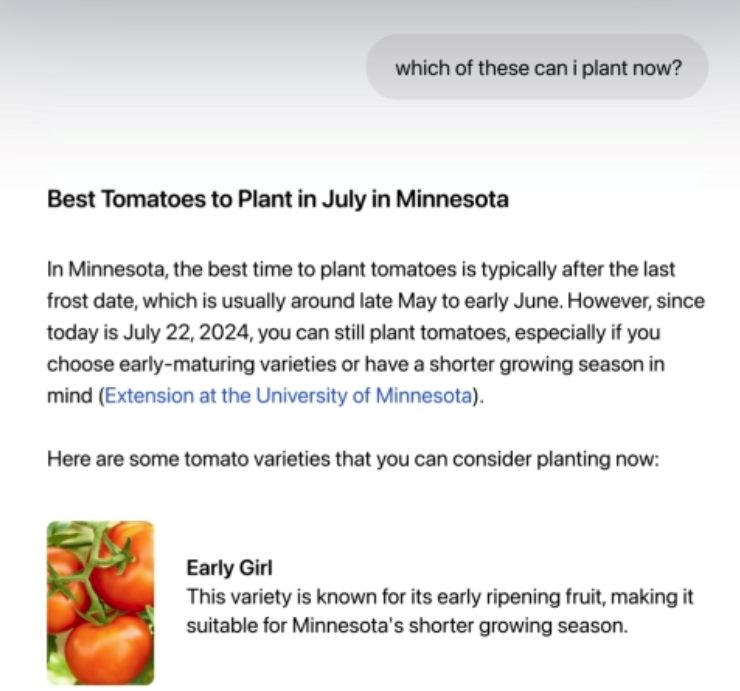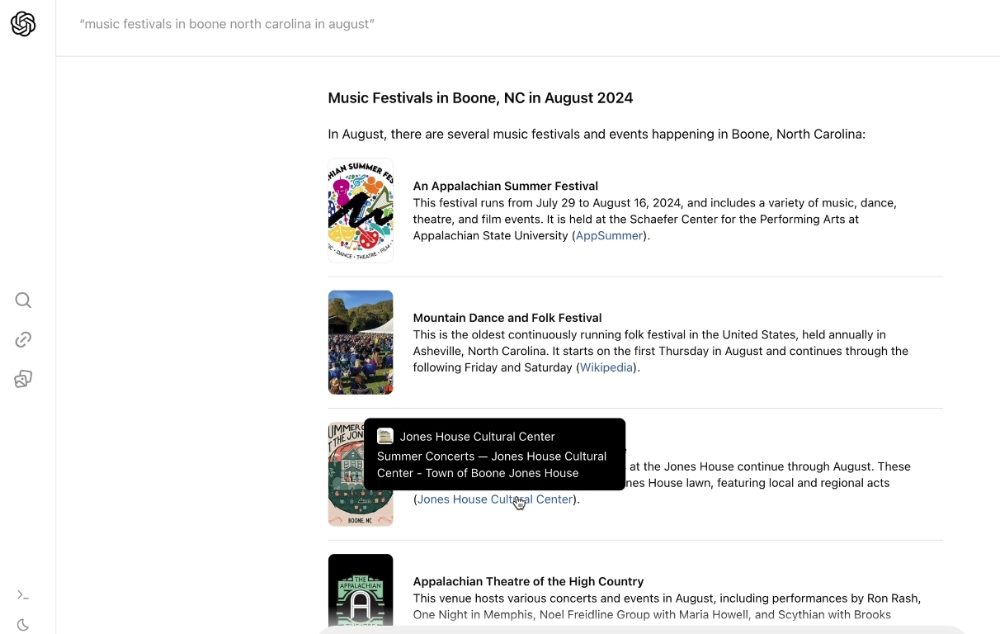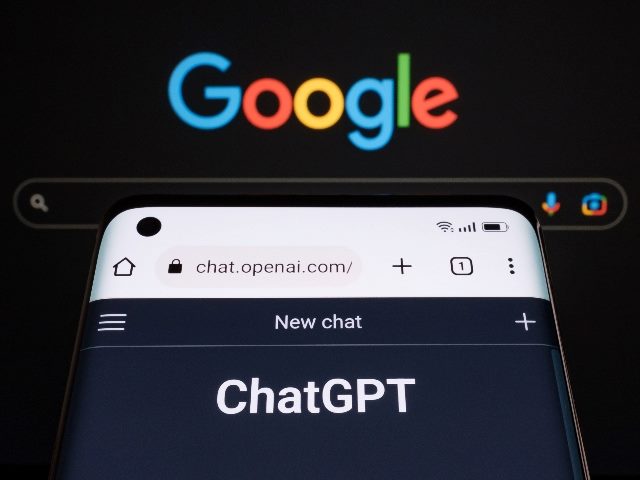The Gist
- Personalized interaction. SearchGPT enhances search with tailored, interactive responses.
- Ethical AI use crucial. OpenAI ensures SearchGPT cites sources to maintain information integrity.
- AI redefines search norms. SearchGPT offers direct answers, challenging traditional search methods.
OpenAI has announced the launch of the prototype of its long-awaited entry into search, SearchGPT, an AI-powered search tool poised to revolutionize the traditional search engine experience. OpenAI's SearchGPT is designed to enhance user interaction with search engines by integrating advanced conversational capabilities, enabling more personalized and context-aware search results.
Given the potential impact of OpenAI's SearchGPT on advertising, marketing, SEO and website attribution, marketers and advertisers will be paying close attention as details emerge. SearchGPT, powered by OpenAI models including GPT-3.5, GPT-4 and GPT-4o, is currently available to a small group of users and publishers as a prototype. For those interested in trying out the features of SearchGPT, a waitlist is available on OpenAI's website.

OpenAI's SearchGPT Has Advanced Conversational Capabilities
Unlike conventional search engines that rely heavily on keywords, OpenAI's SearchGPT understands the nuances, context and intent behind user queries. This allows for a more interactive search experience where users can ask follow-up questions and receive refined answers tailored to their specific needs. SearchGPT delivers AI-generated answers directly within the search results. It also supports various widgets for additional functionalities, such as weather updates and calculators, promising a more comprehensive search experience.
"Getting answers on the web can take a lot of effort, often requiring multiple attempts to get relevant results," OpenAI stated in a blog post. "We believe that by enhancing the conversational capabilities of our models with real-time information from the web, finding what you're looking for can be faster and easier."
Jason Seeba, CMO at Session AI, an in-session marketing solution provider, told CMSWire that AI is clearly going to transform search. "Instead of delivering a list of results, people are going to expect direct answers,” suggested Seeba. “There will be a new need for transparency as it may be harder to tell the difference between what is organic vs. sponsored content. That means more disclosure, but also potentially more regulation."
Related Article: What OpenAI Search Would Mean for Marketers
Personalization and User Satisfaction
One of the standout features of OpenAI's SearchGPT is its ability to personalize responses based on user behavior and preferences. This personalization significantly enhances user satisfaction and productivity by extracting relevant information from multiple web pages and ensuring the content aligns with the user's query context.

SearchGPT goes beyond keywords by learning from user interactions and preferences, which helps deliver tailored recommendations and search answers aligned with individual interests. This approach is poised to save time and effort, providing a more satisfying search experience. Additionally, the tool was designed to provide a streamlined and interactive user experience by integrating AI-generated responses with traditional search results, with the result said to be more like a conversation with a very knowledgeable friend.
Related Article: OpenAI Wants to Get Big Fast, and 4 More Takeaways From a Wild AI Moment
Ethical AI Use and Content Attribution
Ethical AI use is a cornerstone of SearchGPT, with OpenAI emphasizing the importance of grounding answers in verified sources to reduce misinformation and enhance trust. SearchGPT continuously learns from user interactions to improve its responses, maintaining high standards of accuracy and relevance, OpenAI claims. The tool employs rigorous data validation techniques to ensure that the information it provides is accurate and up-to-date.
This launch comes at a critical time when AI-powered search tools are under scrutiny. Incidents involving AI-generated search results have highlighted the potential for significant errors and ethical concerns. OpenAI's stated position, a commitment to a symbiotic relationship between technology and content, respecting and protecting journalism and publishers, aims to address these issues head-on.
OpenAI has positioned SearchGPT as a responsible deployment in the AI search tool market, especially amid concerns over plagiarism, inaccuracies and content cannibalism that have plagued other AI-powered search tools.
According to OpenAI, SearchGPT will prominently cite and link to publishers, providing clear, in-line, named attribution. The announcement of SearchGPT stated, “We are committed to a thriving ecosystem of publishers and creators. We hope to help users discover publisher sites and experiences, while bringing more choice to search. SearchGPT is designed to help users connect with publishers by prominently citing and linking to them in searches.”
OpenAI explained that each response includes clear, in-line citations and direct links, ensuring users are aware of the information's origin and can easily access additional results through a sidebar featuring source links. Though this is good news for marketers, how it works out in the end is still up in the air, and there will certainly be a period of adoption and transition going forward.
“The landscape for search may quickly shift meaning that publishers will have to quickly adapt, especially if they've relied on traditional channels,” Seeba said.
In a move that may calm nervous content producers and publishers, OpenAI said it is working with publishers to design the experience and offers a way for website owners to manage how their content appears in search results. This collaboration ensures that the AI respects the rights of content creators and helps maintain the integrity of the information ecosystem. Additionally, OpenAI clarified that websites can appear in search results even if they have opted out of generative AI training.
Industry Endorsements, Erroneous Answers and Redditors
In the announcement, Nicholas Thompson, CEO of The Atlantic, expressed optimism about the partnership with OpenAI, stating, "AI search is going to become one of the key ways that people navigate the internet, and it's crucial, in these early days, that the technology is built in a way that values, respects, and protects journalism and publishers."
Ironically, in an article titled “OopsGPT” The Atlantic was also the first to report that during the initial demonstration of SearchGPT by OpenAI, an erroneous answer was displayed.

In the demo video, a user inquired about music festivals in a North Carolina town for August. SearchGPT incorrectly stated that the concerts would take place in August. In reality, that was when the box office would be closed, as reported by The Atlantic. OpenAI responded to The Atlantic, stating that “This is an initial prototype, and we’ll keep improving it.”
Others espoused their dissatisfaction with OpenAI and SearchGPT on Reddit, stating that OpenAI’s search will turn the web into just another walled garden.
On the other hand, some Redditors believe that the first AI company to get search right will be the big winner, given that even Google hasn't achieved it yet.
Future Integration for SearchGPT
The future integration of SearchGPT features into ChatGPT promises to make searching the web faster, easier, and more reliable, ushering in a new era in AI-powered search technology.
OpenAI's SearchGPT represents a significant step forward in AI-powered search technology, offering a more conversational, personalized and context-aware search experience. While the tool shows great promise in revolutionizing how we interact with search engines, it also faces challenges, as evidenced by the erroneous answer during its initial demonstration.
As SearchGPT moves from prototype to wider release, its impact on digital marketing, content creation and user experience will be closely watched. The success of OpenAI's SearchGPT will depend on its ability to deliver accurate, relevant information while respecting the rights of content creators and maintaining user trust. As OpenAI continues to refine and improve this technology, it may well shape the future of how consumers search for and interact with information online.
